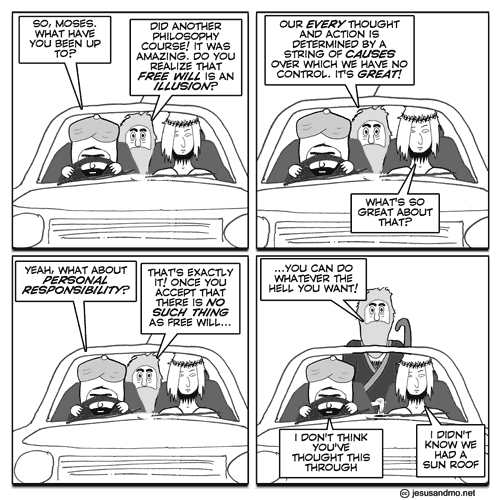"My first act of free will shall be to believe in free will."
LISTEN
LISTEN
On free will: Daniel Dennett and Gregg Caruso go head to head – Daniel C Dennett & Gregg D Caruso | Aeon Essays https://t.co/Z86v2b7BO2 @GreggDCaruso @danieldennett #Philosophy pic.twitter.com/AxPUfutKPz— Aristide (@Aristide1309) December 29, 2018
Do you have free will? Or are you simply a product of your culture? How much responsibility should you take for your actions? Are your neural pathways fixed early on by a mixture of nature and nurture, or is the possibility of comprehensive, intentional psychological change always open? What role does your brain play in the construction of free will, and how much scientific evidence is there for the existence of it?
In this talk, Julian Baggini will explore free will from every angle, blending neuroscience, philosophy, sociology and cognitive science. Contemporary thinking tells us that free will is an illusion, but Baggini challenges this position, providing instead a new, more positive understanding of our sense of personal freedom: a freedom worth having.
Julian Baggini is a British philosopher and author of several books including ‘The Ego Trick’, ‘The Pig that Wants to be Eaten’, ‘Freedom Regained’, and most recently ‘A Short History of Truth.’ He runs the popular blog: Microphilosophy, and writes regularly for national newspapers and magazines such as the Guardian, the Financial Times, the TLS and Prospect. He is a regular guest on BBC Radio 4, and tweets at @microphilosophy.==
Christians (and others) often insist that free will is God's gift. But is the Judeo-Christian God even compatible with human free will?

If we don't have free will, does that really make us free of personal responsibility and free to do whatever the hell we want? "Moses" thinks so, but hasn't thought it entirely through.

More J&M
==
Man can do what he wills but he cannot will what he wills.”
― Essays and Aphorisms
“But recently I have learned from discussions with a variety of scientists and other non-philosophers (e.g., the scientists participating with me in the Sean Carroll workshop on the future of naturalism) that they lean the other way: free will, in their view, is obviously incompatible with naturalism, with determinism, and very likely incoherent against any background, so they cheerfully insist that of course they don't have free will, couldn’t have free will, but so what? It has nothing to do with morality or the meaning of life. Their advice to me at the symposium was simple: recast my pressing question as whether naturalism (materialism, determinism, science...) has any implications for what we may call moral competence. For instance, does neuroscience show that we cannot be responsible for our choices, cannot justifiably be praised or blamed, rewarded or punished? Abandon the term 'free will' to the libertarians and other incompatibilists, who can pursue their fantasies untroubled. Note that this is not a dismissal of the important issues; it’s a proposal about which camp gets to use, and define, the term. I am beginning to appreciate the benefits of discarding the term 'free will' altogether, but that course too involves a lot of heavy lifting, if one is to avoid being misunderstood.”
― Consciousness Explained
― Consciousness Explained
“Losing a belief in free will has not made me fatalistic—in fact, it has increased my feelings of freedom. My hopes, fears, and neuroses seem less personal and indelible. There is no telling how much I might change in the future. Just as one wouldn’t draw a lasting conclusion about oneself on the basis of a brief experience of indigestion, one needn’t do so on the basis of how one has thought or behaved for vast stretches of time in the past. A creative change of inputs to the system—learning new skills, forming new relationships, adopting new habits of attention—may radically transform one’s life.”
― Free Will
― Free Will
“Know, then, that now, precisely now, these people are more certain than ever before that they are completely free, and at the same time they themselves have brought us their freedom and obediently laid it at our feet. It is our doing, but is it what you wanted? This sort of freedom?'
Again I don't understand', Alyosha interrupted, 'Is he being ironic? Is he laughing?'
Not in the least. He precisely lays it to his and his colleagues' credit that they have finally overcome freedom, and have done so in order to make people happy.”
― The Brothers Karamazov
Again I don't understand', Alyosha interrupted, 'Is he being ironic? Is he laughing?'
Not in the least. He precisely lays it to his and his colleagues' credit that they have finally overcome freedom, and have done so in order to make people happy.”
― The Brothers Karamazov
More determinism quote
==
Freedom Evolves
by
 Can there be freedom and free will in a deterministic world? Renowned philosopher Daniel Dennett emphatically answers "yes!" Using an array of provocative formulations, Dennett sets out to show how we alone among the animals have evolved minds that give us free will and morality.... drawing upon evolutionary biology, cognitive neuroscience, economics, and philosophy [he argues that] far from being an enemy of traditional explorations of freedom, morality, and meaning, the evolutionary perspective can be an indispensable ally. Dennett seeks to place ethics on the foundation it deserves: a realistic, naturalistic, potentially unified vision of our place in nature. g'r
Can there be freedom and free will in a deterministic world? Renowned philosopher Daniel Dennett emphatically answers "yes!" Using an array of provocative formulations, Dennett sets out to show how we alone among the animals have evolved minds that give us free will and morality.... drawing upon evolutionary biology, cognitive neuroscience, economics, and philosophy [he argues that] far from being an enemy of traditional explorations of freedom, morality, and meaning, the evolutionary perspective can be an indispensable ally. Dennett seeks to place ethics on the foundation it deserves: a realistic, naturalistic, potentially unified vision of our place in nature. g'rFrom Bacteria to Bach and Back: The Evolution of Minds
by
 How did we come to have minds? For centuries, poets, philosophers, psychologists, and physicists have wondered how the human mind developed its unrivaled abilities. Disciples of Darwin have explained how natural selection produced plants, but what about the human mind?
How did we come to have minds? For centuries, poets, philosophers, psychologists, and physicists have wondered how the human mind developed its unrivaled abilities. Disciples of Darwin have explained how natural selection produced plants, but what about the human mind?In From Bacteria to Bach and Back, Daniel C. Dennett builds on recent discoveries from biology and computer science to show, step by step, how a comprehending mind could in fact have arisen from a mindless process of natural selection. A crucial shift occurred when humans developed the ability to share memes, or ways of doing things not based in genetic instinct. Competition among memes produced thinking tools powerful enough that our minds don’t just perceive and react, they create and comprehend. g'r
.



Seems like there's enough compelling reasons to believe that we can treat people as responsible (that is, responsive to correction) without bothering with the question of free will. We have an interest in normalizing certain kinds of behavior. We don't need to agree that Bob freely stole the car in order to, via feedback mechanisms, make it less likely that he or another person steals a car again. Is it too simple to just start there?
ReplyDeleteAlthough, I should add, when a notion of free will is so grand as to minimize the importance of determining forces, then it becomes more necessary to philosophize about the matter.
ReplyDeleteI mentioned this with Dr. Oliver by recounting my effort many years ago to push for criminal justice reform in KY. Several people in the audience just didn't buy lessening punishment (understood simply as that which someone deserves for doing wrong and not as a means for curbing behavior). They thought criminals should be punished because they made a wrong choice, one they didn't have to make regardless of forces and factors. Talk about determinism undermined that notion and was heard by them as an excuse.
The hunger for retribution and punishment is deeply imbued in our species. I wonder how much of that is due to religious indoctrination, and how much to some ancestral urge to punish "them" (the ones it's us against).
ReplyDeleteSeparating questions of legal/moralresponsibility from the metaphysical question of the reality of free will does seem like the pragmatically prudent thing to do, to me.
Dennett references Sean Carroll and the future of naturalism, in the quote above from "Consciousness Explained"...
ReplyDeletePoetic Naturalism
Naturalism comes down to three things.
1. There is only one world, the natural world.
2. The world evolves according to unbroken patterns, the laws of nature.
3. The only reliable way of learning about the world is by observing it.
...The poetic aspect can also be summarized in three aspects.
1. There are many ways of talking about the world.
2. All good ways of talking must be consistent with one another and the world.
3. Our purposes in the moment determine the best way of talking...
Ten Considerations...
Sean Carroll, The Big Picture: On the Origins of Life, Meaning, and the Universe Itself